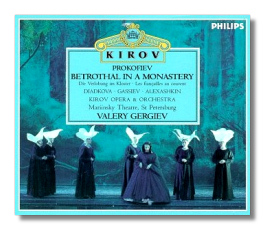
The Internet's Premier Classical Music Source
Related Links
- Prokofieff Reviews
- Latest Reviews
- More Reviews
-
By Composer
-
Collections
DVD & Blu-ray
Books
Concert Reviews
Articles/Interviews
Software
Audio
Search Amazon
Recommended Links
Site News
 CD Review
CD Review
Serge Prokofieff

Betrothal in a Monastery
- Anna Netrebko (soprano; Louisa)
- Larissa Diadkova (Mezzo-soprano; The Duenna)
- Nikolai Gassiev (Tenor; Don Jerome)
- Alexander Gergalov (Baritone; Don Ferdinand)
Kirov Theater Chorus
Kirov Orchestra/Valery Gergiev
Philips 462107-2 3CDs
All right, I'm a little late in reporting on this issue in the ongoing Gergiev/Prokofieff opera series. But better late than never, I must say, since this recording is an important addition to the Prokofieff discography and in the very active career of superstar Russian conductor Valery Gergiev.
There have been two other complete recordings of this opera, both of Soviet origin, the old Abdullayev, last issued on Le Chant du Monde, and the Ermler, which I haven't heard. Gergiev's singers, on the whole are inferior to those of Abdullayev, who had Valentina Kaievchenko in the role of Louisa and Nikolai Korchunov as Don Jerome, both of whom were vastly superior to Gergiev's Anna Nebtrebko and Nikolai Gassiev: try Korchunov's virtuosic singing in the lengthy passage with chorus leading to the opera's closing number, or to the Act III duet between Louisa and Antonio where Kaievchenko beguiles and Netrebko merely sounds involved. Was there ever a Russian soprano with a more beautiful voice than that of the little-known Kaievchenko? I know of none.
But the game doesn't end here. Gergiev has a grasp of this opera's many facets that is every bit as effective as Abdullayev's, and his orchestral work is extremely convincing too. In the end, he is as alert to the work's humor – this opera is all about mixups and double-crossings and disguises – and to Prokofieff's colorful orchestral interludes, as well as to the flow of the drama. It's hard to decide who has a more Prokofieffian character here, but Gergiev has better sound and may offer more spirited orchestral playing – try the colorful buildup from Act I, Scene 7.
The Abdullayev may no longer be available and the Ermler is certainly less readily available, two circumstances which make this recording eminently necessary to those interested in this Prokofieff masterpiece. But even if the others are obtainable, this might still be the recording of choice, not least because of Philips fine sound, which leaves the old Abdullayev well in the dust.
Copyright © 2002, Robert Cummings


















